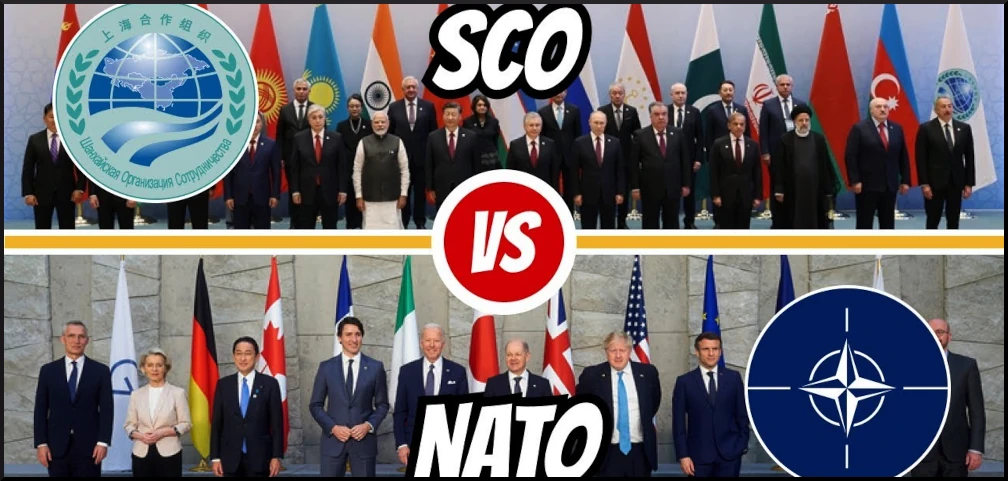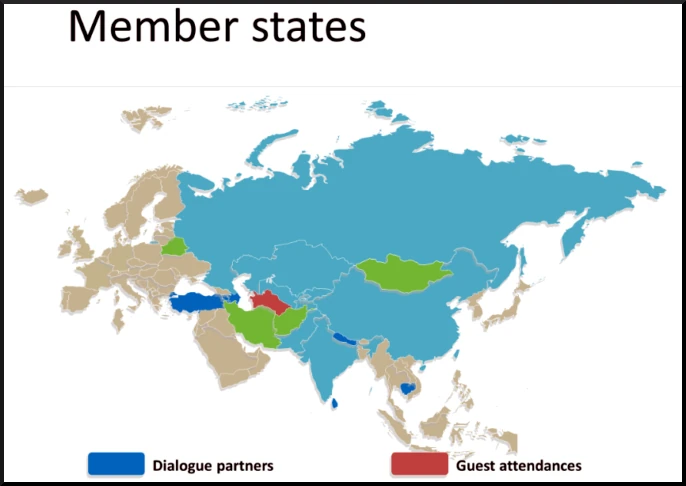by Sara Flounders, published on Workers World, July 27, 2024
Two major security alliances held summits in July. Each summit consisted of a bloc of major powers and nearby countries. Both alliances hold military exercises. Each summit meeting included guest and observer countries.
The two summits could not have been more different in tone and in purpose.
The Shanghai Cooperation Organization (SCO) met in Astana, Kazakhstan, on July 3-4, to discuss mutual cooperation.
A week later the North Atlantic Treaty Organization met in Washington, D.C., on July 9-11 to celebrate 75 years of militarism. At the meeting, NATO dared to demand Russia, China, Iran and the Democratic People’s Republic of Korea (DPRK) sever ties with each other.
NATO has expanded from 12 original countries to 32 member states reflecting 12% of the world population and 16% of the world landmass.
Now with 10 member states and 14 dialogue partners, the SCO makes up 42% of the world population and covers 29% of the world landmass. The SCO has now incorporated India, Pakistan, Iran and Belarus as its newest members.
The title of the SCO Summit was “Strengthening Multilateral Dialogue — Striving Towards a Sustainable Peace and Prosperity.”
The title of the NATO Summit was “Ukraine and Transatlantic Security.”
The two meetings represent two very different classes and historic experiences.
The final documents of the two alliances, released at the conclusion of their meetings, could not be starker in concept or in wording. It is worth reading both documents, for which we include links at the end of this article.
NATO Summit Declaration
The NATO Summit Declaration reads like a temper tantrum. It exposes the frustration of the U.S., Japan, Germany, Britain, France, Canada and Italy (the G-7) imperialist powers at their failing military efforts in Ukraine and their inability to impose economic destabilization and “regime change” in Russia. In the document and in the meetings, they blame this failure on China, Iran and the DPRK.
The NATO document brags about the alliance’s grand military power while being full of insults, accusations and wild threats against those it names its rivals. It sputters with indignation against countries that resist adhering to NATO’s dictates. It avoids addressing the major problems facing the planet as a whole, including development and the environment.
It is stunning to read of NATO’s arrogance, on display to the whole world, of demanding that China break what is normal trade relations with Russia. According to the declaration, China must “cease all material and political support … including raw materials that serve as inputs for Russia’s defense sector.” And, it states, “the PRC continues to pose systemic challenges to Euro-Atlantic security.” China, which the document labels an “enabler” … “continues to challenge our interests, security and values.”
The declaration also threatens Iran, the DPRK and Belarus for “fueling” and “providing direct military support to Russia, for war in Ukraine.”
The NATO Declaration repeatedly pledges “long-term … immediate and enduring support to Ukraine.” It enumerates air defense systems, other military capabilities and an “irreversible path to … NATO membership” for Ukraine: “We affirm our determination to support Ukraine in building a force capable of defeating Russian aggression [sic] today and into the future.”
The document pledges tens of billions of dollars in assistance to Ukraine. It publicly demands extra military spending by all members. “Ukraine’s future is in NATO,” it concludes.
NATO plans new nuclear weapons
NATO calls for “integration of space into our planning, exercises and multidomain operations … investing in our chemical, biological, radiological and nuclear capabilities. … Nuclear deterrence is the cornerstone of Alliance security … including by modernizing its nuclear capabilities, strengthening its nuclear planning capability.”
The document boasts, with obvious pride, that “[D]efense expenditures have grown by 18% in 2024, the biggest increase in decades.”
The arrogant, self-satisfied leaders at the NATO summit ignore the ruin their failed wars in the last 25 years have created, for example, in Yugoslavia, Iraq, Libya, Syria and Afghanistan. Nor is there mention of their many coups, assassinations and disappearances. This is just wreckage left behind.
Justifying plans for expanding to form a global NATO directly aimed at China and the DPRK, the declaration “welcomes the leaders of Australia, Japan, New Zealand, and the Republic of Korea, and the European Union to discuss common security challenges and areas of cooperation. … The Indo-Pacific is important for NATO, given that developments in that region directly affect Euro-Atlantic security.”
The NATO declaration omits its summits’ usual empty promises to improve living standards, health, education or climate remediation. Clearly these enormous problems are not on the agenda of its powerful members, whose concerns are strategic power and profits.
Only threats – No solutions
This block of imperialist leaders are so used to arrogantly having their way that they seem unable to take stock of the deteriorating global position of the regimes and states they rule.
NATO’s grand proclamation contains not a shred of examination of its leading members’ failing economic and political standing in the world. Instead, it asserts that NATO remains the strongest alliance in history. They call it “unique, essential and indispensable.”
It is in the profit-driven, class interests of privately owned U.S. and other imperialist corporations to keep formerly colonized countries of the Global South underdeveloped as a cheap source of raw materials and labor. Constant wars and occupations are a ruthless part of this destabilizing process.
Finding a way out of this dependency is only possible with intense cooperation and common defense, even among countries with very different social systems, customs and history. The SCO and other emerging alliances of countries of the Global South are signs of this need for unity when facing imperialist demands and threats.
The Final Declaration of the SCO opens with a recognition of the enormous changes underway in the world: “Tectonic shifts are underway in global politics, economy and other spheres of international relations. A fairer multipolar world order is being born, with broader opportunities for national development and mutually beneficial and equal international cooperation. At the same time, we see broader use of force, regular violations of international law, growing geopolitical confrontation and conflicts and increasing risks to stability and peace in the SCO region.”
As reflected in the Final Declaration, the SCO meeting focused on energy cooperation among its members, cross-border transportation corridors, gas pipelines, funds to develop their technology and strengthen equitable trade,
Member states seek to “create international relations of a new type in the spirit of mutual respect, justice, equality and mutually beneficial cooperation.” They consider “unacceptable, the attempts to ensure one’s security at the expense of others.”
On Palestine, this bloc of countries stresses the importance of ensuring an immediate, complete and stable ceasefire, as well as access of Gaza’s population to humanitarian aid, and demands intensifying efforts to restore peace, stability and security for all populations in the region.
The governments of many of these SCO members are trying to break out of the economic strangulation of U.S. sanctions, which has artificially cut off trade and international development funds. The SCO declaration criticized “unilateral sanctions and trade restrictions that undermine the multilateral trading system and impede global sustainable development.”
The SCO member states emphasized that the unilateral adoption of sanctions “is incompatible with the principles of international law and has a negative impact on third countries and international economic relations.”
SCO – a defensive alliance
The SCO was originally formed as a defensive alliance of countries of Eurasia whose governments were determined to restrict the incursion of U.S. military bases into their region.
It was founded in June 2001. Its original members were China, Russia, Kazakhstan, Uzbekistan, Kyrgyzstan and Tajikistan. But it was not strong enough to prevent U.S. imperialist entry into their region.
U.S. imperialism used the Sept. 11, 2001, attack as a pretext to storm into the entire region, for what Washington called a “War on Terror.” Suddenly U.S. and NATO member countries had stationed more than 100,000 U.S. troops, thousands of troops from other NATO countries and tens of thousands of mercenary contractors at 35 bases and military installations and countless forward operations centers in Afghanistan.
U.S. imperialism, with the entire NATO block of imperialist powers, exerted overwhelming pressure on the countries of the former Soviet Union, which as separate capitalist countries were isolated and relatively poor. The U.S. military gained access to former military bases of the USSR. Suddenly there were hundreds of U.S. troops, aircraft and vast warehouses at bases in Uzbekistan and Kyrgyzstan. Washington planned to establish other bases and facilities in the region.
U.S. strategists planned to use its bases in Afghanistan and the former Soviet republics of Central Asia to assert U.S. corporate dominance over this resource-rich area. These bases would exert a continuous military threat against Russia, China and Iran.
On July 5, 2005, the Shanghai Cooperation Organization, now with the inclusion of Uzbekistan, held a summit meeting in Kazakhstan. The SCO meeting called on the United States to set a deadline for the removal of its military bases from Central Asia. The SCO declared then that “common security concerns and economic partnership in priority areas of trade, sustainable development, and agriculture” was their goal.
Today the still developing SCO security alliance should be evaluated in the context of a whole series of other emerging alliances and trade agreements. This includes the BRICS+ (Brazil, Russia, India, China, South Africa and other countries) trade alliance on an international level.
The Belt and Road Initiative, a global development strategy, begun by China in 2013, now offers exciting infrastructure possibilities, including schools, medical centers, roads, ports, railroads, mines, refineries, new irrigation techniques, fertilizer production and food processing.
Because China has a socialist planned economy in all fundamental areas of development, China is in a position to share its technology globally. Over 150 countries have signed on to Belt and Road programs. These programs are a concrete alternative to subservience to imperialist financial enslavement.
Tying a country’s economy to imperialism means that country is forced to buy billions of dollars in outdated military equipment from U.S. military contractors for endless war. It means signing imposed contracts with U.S. military bases. It means holding International Monetary Fund and World Bank loans with high interest and onerous conditions. The Belt and Road programs offer an exciting option that is shifting aspirations of all the formerly colonized countries.
These development projects along with a whole series of bilateral meetings and exchanges taking shape around the world cause the growing frustration of U.S. imperialism and the G-7 imperialist, formerly colonial powers.
NATO Washington Summit Declaration
Sara Flounders is an American political writer who has been active in ‘progressive’ and anti-war organizing since the 1960s. Sara is Co-Director of the International Action Center (IAC) and a member of the Secretariat of Workers World Party She also frequently writes for Workers World newspaper and publishes articles on the International Action Center website

